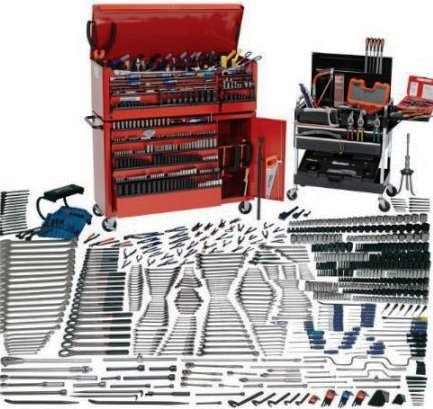Discover how Much Auto Mechanics get Paid

Many looking for a career become interested in finding out how much auto mechanics get paid. The compelling thing about this question is it really doesn’t have a solid answer. With that said, we can take you through the process of what it’s like to work as an auto mechanic in a retail service environment.
You’ll find out how much you can expect to make a week turning wrenches. And we’ll attempt to put a dollar figure on the yearly salary a skilled mechanic can expect to earn in a busy auto repair shop. Finally, you’ll learn about the flat rate compensation system and the feast or famine scenario, it can create for those caught up in this type of pay plan.
Subtracting Expenses from Gross Compensation

Before we begin to discuss how much auto mechanics get paid we need to talk about the expenses involved in the profession. As for the training required to secure a position as a professional mechanic, school tuition runs well below college tuition. However, when compared with other skilled mechanical trades these schooling expenses seem a little pricey.
Nevertheless, there are creative ways to bring these expenses down. As an example, instead of opting for nationally recognized automotive training centers you can look into manufactured sponsored training. Car makers like General Motors, Toyota and Ford are always looking for dealership technicians to replace retiring mechanics. They offer attractive co-op programs that can help launch a career.
When we start talking about how much an auto mechanic gets paid, we cannot forget to subtract expenses. Primarily, the tools used in the trade. An empty toolbox can cost $15,000 if you want to go with the top-of-the-line unit. You can spend double that in filling those drawers with the necessary tools and equipment you need to repair cars. Even at Wal-Mart tool prices you can drop 40 grand. Therefore, unlike doctors and lawyers, when you start looking at paychecks and yearly salary don’t forget to deduct these expenses.
The Pros and Cons Facing an Auto Mechanic
Another important thing to mention before we start talking about the money mechanics can make, is this job is not for everyone. However, for those looking for a challenging position with room for advancement this job fills that need. Although you might not like working outside in the elements, the day goes fast and the job isn’t boring.

This is little consolation if you’re working at an auto repair shop just outside of Death Valley, Arizona. Very few auto repair shops provide any kind of air-conditioning for their service staff. However, if you decide to take a position in Nome, Alaska repairing four-wheel-drive trucks, they will probably have an adequate heating system.
The other consideration about the physical effort required to fix an automobile becomes the long term toll on the human body. Mechanics must work smart and wear protection. This includes eye protection, dust masks, back braces, hardhats and ear plugs. Failure to wear this equipment can mean an early retirement. And not in a good way. Mechanics turning wrenches for 30 years or more often have back problems and hearing damage.
How Much Mechanics Get Paid
As with aviation and airline mechanics, automotive technicians will find hourly pay rates tied to a supply and demand ratio. In some parts of the country finding a person willing to put up with the pain and suffering of working outside on heavy equipment becomes an impossible task. The few and the proud willing to step up and take these positions can demand a pay rate that falls within the top 1% of this industry.

There’s one caveat to this supply and demand equation. How much mechanics get paid can also relate to the years of experience and the amount of ASE certifications the technician holds. If the automotive technician provides references showing a proven track record of successfully repaired automobiles this overrides the years of experiences and amount of certifications required for top pay.
Now we’re ready to start talking about cold hard numbers. A journeyman mechanic fresh out of automotive training with no previous job experience pulls in a miserable amount of money for the work involved. With that said, you got to start somewhere. We call this starting at the bottom. Beginning salaries can run in the $500 a week range. This puts yearly compensation at $27,000. Remember, this does not include the expenses involved with maintaining a professional set of tools.
Placing a dollar figure on the yearly compensation for an experienced technician, with five or 10 years experience becomes much more difficult. The flat rate system, which we will explain below, puts your compensation in the category of feast or famine. Mechanics can make $100,000 a year under the right circumstances. They can also pull in an average of $40,000 a year. This conservative number remains much more common in the automotive retail service industry.
How Auto Mechanics Make Money
The problem with the retail auto service business remains the way that many technicians make money. Thankfully, the flat rate pay structure is starting to lose its popularity thanks to a new focus on customer satisfaction. The flat rate system is a type of compensation where the mechanic is paid by the job instead of the physical amount of hours worked.
As an example, if an auto mechanic replaces a timing chain they receive a certain amount of labor hours. The auto repair center uses a standardized labor guide to achieve this amount. If the timing chain job pays five hours in the labor guide they receive five hours at their hourly rate to complete the repairs. If the task takes them eight hours he still only receives five hours of pay.
On the other hand, if he can do this repair in one hour he still receives five hours of compensation. As you can see this type of pay plan forces the mechanic into a situation where they must work as quickly as possible. In desperate times technicians sacrifice quality or the longevity of the repair to put food on the table.
However, smart repair centers are starting to shift back to a standard hourly wage. This stabilizes the quality of individual repairs. Nevertheless, another issue with the flat rate pay system is when the retail automotive center doesn’t use a standardized labor guide. In this situation, technicians receive less compensation and customers charged more. This increases the shop’s profit margin, but everybody else involved in the repair becomes unhappy.


